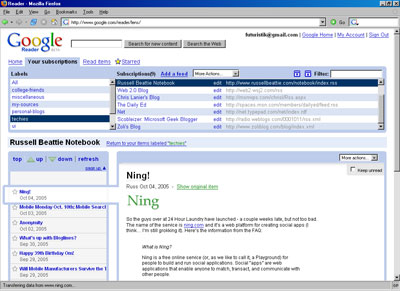Google just launched their RSS Reader, Google Reader. It looks real cool and certainly a competition killer. It is running too slowly now, with lots of people taking their first look at it. I was trying to import my OPML file but it just wouldn't let me do that. Too slow at the moment. But then, as things cool off, it certainly looks like an easy way to read all my feeds online.
Update:
After a long long wait, The OPML subscriptions have been imported and this is how my Google Reader looks like. Looking forward to playing around with it, but on first looks, it makes fantastic use of AJAX lending ability to sort and organize content very efficiently. And Gmail's "star" thingy is over here too.

Technorati Tags: GoogleReader RSS
Update:
After a long long wait, The OPML subscriptions have been imported and this is how my Google Reader looks like. Looking forward to playing around with it, but on first looks, it makes fantastic use of AJAX lending ability to sort and organize content very efficiently. And Gmail's "star" thingy is over here too.

Technorati Tags: GoogleReader RSS
Comments